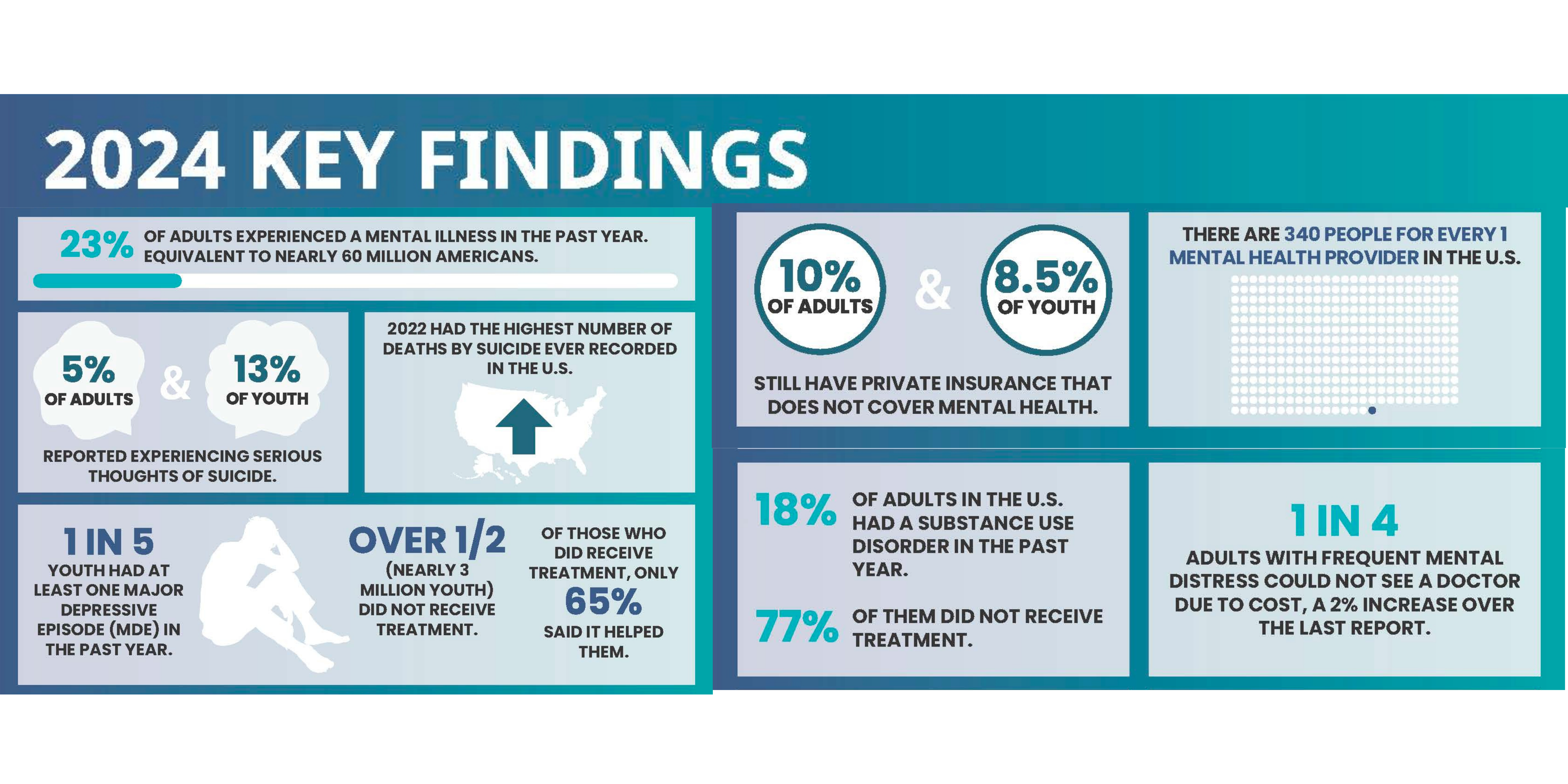
As we progress through 2024, the state of mental health in the United States remains a critical issue, highlighted by the latest statistics:
- In 2021-2022, 23% of adults experienced a mental illness in the past year, equivalent to nearly 60 million Americans.
- More than 5% of the U.S. adult population (12.8 million people) reported experiencing serious thoughts of suicide. The number of individuals who died by suicide in 2022 was the highest ever recorded in the U.S., despite slight decreases in suicide deaths in 2019 and 2020.
- 13% of youth ages 12-17 reported experiencing serious thoughts of suicide. The percentage was highest among youth who identified as Native Hawaiian or Other Pacific Islander (25%) and those of more than one race (20%).
- 1 in 5 youth had at least one major depressive episode (MDE) in the past year. Over half of them – nearly 3 million youth – did not receive treatment, and of those who did, only 65% found it helpful.
- The vast majority of individuals with a substance use disorder in the U.S. are not receiving treatment. 18% of adults had a substance use disorder in the past year, with 77% not receiving treatment.
- 9% of youth in the U.S. had a substance use disorder in the past year, with youth more likely to struggle with drugs (7%) than alcohol (3%).
- 60.5% of youth in the U.S. are flourishing, which is associated with school engagement and other positive outcomes. The highest percentages were in Georgia, Illinois, and Hawaii.
- Cost remains a significant barrier to accessing mental health care, with 1 in 4 adults with frequent mental distress unable to see a doctor due to cost, a 2% increase over the last report.
- 10% of adults with a mental illness are uninsured, and 64% of uninsured adults in 2022 cited affordability as the reason for lacking health insurance.
- Millions of adults and youth in the U.S. still lack parity in insurance coverage of mental health and substance use services. 10% of adults and 8.5% of youth have private insurance that does not cover mental health.
- Only 0.67% of students are identified as having an emotional disturbance (ED) for an Individualized Education Program (IEP). While there was an increase in mental distress among students from 2019-2021, the percentage of students identified with ED for an IEP decreased in all states except Wyoming, Texas, and South Dakota.
- There are 340 people for every 1 mental health provider in the U.S., although this may overestimate active professionals as it might include those no longer practicing or accepting new patients.
Addressing the Crisis: A Holistic Approach
These alarming statistics underscore the urgent need for comprehensive and accessible mental health care in the U.S. The challenges are vast, but so are the opportunities for innovation and improvement. Addressing mental health issues requires a holistic approach that integrates mental, physical, and social health to provide comprehensive care.
One effective strategy is to utilize advanced technology to bridge the gaps in care and support. This is where innovative digital healthcare solutions come into play, offering a means to enhance existing care models and create new pathways for support and treatment.
The Role of Technology in Mental Health Care
Advanced platforms that incorporate AI and data analytics can provide personalized care, ensuring that treatment plans are tailored to the unique needs of each individual. These platforms facilitate integrated services, making it easier to coordinate care across different aspects of a patient's health. They also improve accessibility by offering remote care options and tools that reduce the cost barriers associated with traditional mental health care.
Transforming Mental Health Care: kbrax's Comprehensive Solutions
At kbrax, we are at the forefront of this transformation with our CompleteCarePlatform®. This platform is designed to address all aspects of one's well-being, integrating mental and physical health with social support. Our AI-empowered solution ensures that every individual's journey to wellness is met with cutting-edge technology and compassionate care.
- Personalized Care: Our platform uses AI to create tailored treatment plans that cater to individual needs.
- Integrated Services: We bridge the gap between mental and physical health care, ensuring seamless coordination.
- Accessibility: We are making mental health care more affordable and accessible, removing barriers such as cost and insurance coverage.
- Support System: We involve care teams, friends, family, and other trusted individuals in the care process to create a robust support system.
Our Mission
We believe that a shared journey is most often a successful journey. By involving care teams, friends, family, and other trusted individuals in the care process, we can create a support system that enhances the chances of positive outcomes. Our mission is to assist organizations, payers, and stakeholders in offering all-inclusive, personalized care, supporting and prioritizing the Collaborative Care Model (CoCM) and the Innovation in Behavioral Health Model (IBHM) by CMS.
Conclusion
The state of mental health in the U.S. is a pressing concern that demands immediate attention and innovative solutions. By leveraging advanced technology and collaborative care models, kbrax is addressing these challenges head-on. Together, we can create a future where mental health care is not just a necessity but a priority, ensuring that every individual has the opportunity to thrive.
